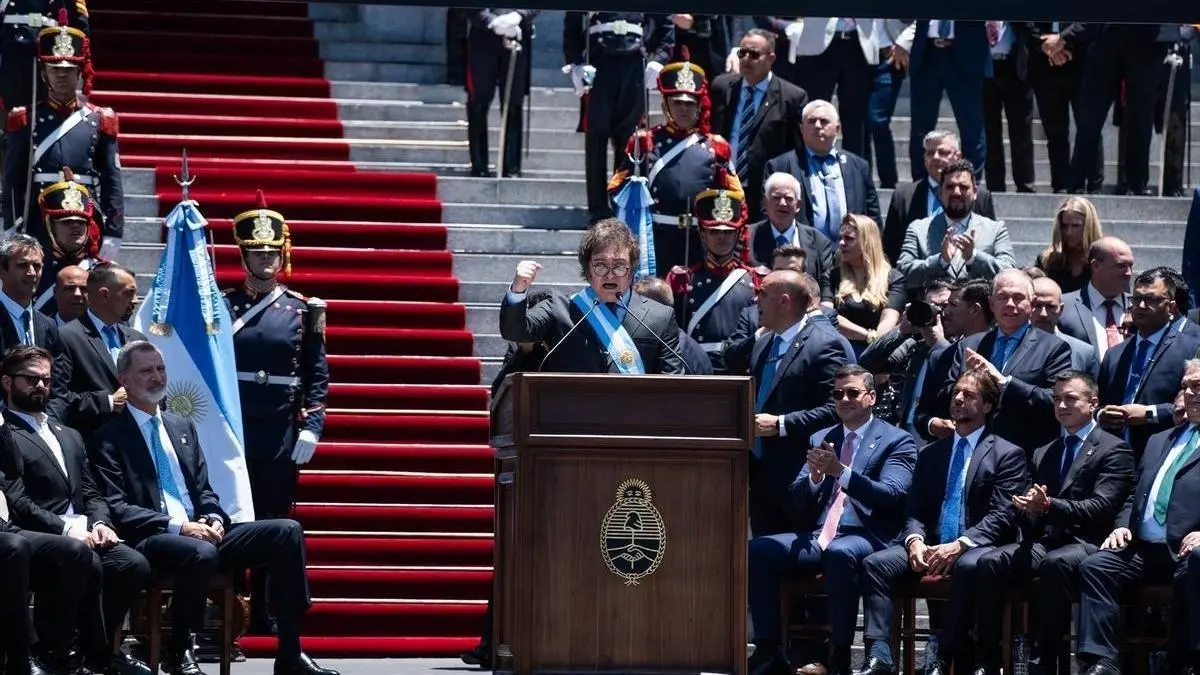Bitter pill to swallow for Argentina, there is no money

The new President of the Republic of Argentina, Javier Milei, without contemplation or hot air, administered a horse dose of stark realism to the people, congregated next to the steps of the National Congress. No other presidential inauguration or investiture speech has ever been so brutally forceful:
"There is no money", he repeated insistently to justify a monumental 5% fiscal "shock adjustment" in the battered public accounts inherited from Kirchnerism, the last version of a Peronism that had invaded everything and seemed to have no end.
There are those who look closely at the pragmatism with which Milei has started his first steps in the Casa Rosada, as if he wanted to start drawing up the long list of promises that the new president will have to break once he has come face to face with reality. This, for the moment, has only been confirmed: the State's coffers are empty; inflation will reach 150% by the end of the year, the foreign debt is simply unpayable, and poverty is already trapping 44% of the population in its clutches.
To counteract all this, as Milei said in a speech in which he weighed every word, there is no alternative but an adjustment, "which will be the last straw to begin the reconstruction of Argentina". It was the only counterpoint of hope to the hard times ahead, which Milei wanted to underline by stating that "today a new era begins in Argentina after concluding a long and sad history of decline".
The president, who was cheered by such unusual shouts as "Freedom, freedom" and "Chainsaw, chainsaw", in allusion to his electoral campaign slogan of brutal pruning of public spending, wanted to calm down the popular classes accustomed to subsidies, explaining that the consequences of the tremendous and imminent fiscal adjustment will fall almost entirely on the State, which will have to cut the innumerable canonies, consultancies and mamandurrias that weigh down the most important economic chapters, all financed, of course, with a cataract of taxes bordering on the confiscatory. .
Self-declared as a "libertarian anarcho-capitalist", Milei has sent to the "electric chair" (as this position is now popularly called) of the Ministry of Economy Luis Caputo, who already held the Ministry of Finance under Mauricio Macri, who is now committed to ensure that Milei's mandate closes the long decadence brought about by Peronism. Thus begins an unprecedented political experience, since its theoretical inspirer, the American Murray Rothbard, has never seen his anarcho-capitalist thesis applied in practice.
Only four Latin American colleagues attended Milei's inauguration: Luis Lacalle Pou (Uruguay), Santiago Peña (Paraguay), Gabriel Boric (Chile) and Daniel Novoa (Ecuador), which is evidence of the fracture in the continent between the left, grouped in the so-called Puebla Group, and the liberal right. Spain, at least, was present thanks to King Felipe VI, a figure that fortunately transcends partisan divides in the Americas as well.
The success or failure of Javier Milei's recently initiated mandate will largely determine the direction Latin America and its supranational institutions, now also divided, will take. From conditioning the actions of Cuban, Nicaraguan and Venezuelan totalitarianism to counteracting Bolivarian expansion; from leaning towards greater economic and commercial cooperation with the United States and Europe or continuing to allow the ever-deepening penetration of China; from joining or not joining the BRICS Group, and finally, from deepening the always desired and invoked integration of Latin America and the Caribbean or letting this project languish.
Seconded by his vice-president, Victoria Villarruel, Javier Milei has already sworn in his nine ministers, just half of those who shepherded his predecessors, Fernández and Fernández. In addition to the head of Economy, his former electoral adversaries Patricia Bullrich, who will be in charge of the Ministry of Security, Luis Petri, who will be in charge of Defense, and Diana Mondino in Foreign Affairs, will be fundamental in such a brief cabinet.
For the time being, the Argentine people are beginning to digest the bitter pill of the inevitable adjustment. Hopefully, as Milei himself has promised, they will soon see the light at the end of the tunnel.

